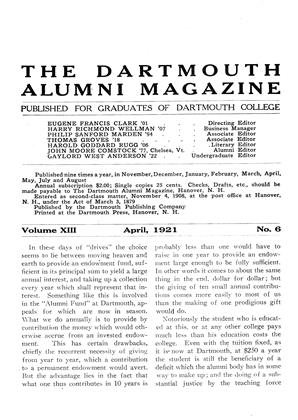The second semester rushing season is now a thing of the past. Two hundred and eighteen freshmen and transfers were pledged in the first place and since then the number has been increased up to about 250. But like everything else of its sort, the merits and failures of the long season are not at first realized. The college is still excited and forms hasty judgments, which unfortunately tend to become permanent.
Now, however, that a month has passed and many delegations have already been initiated, it is possible to take a cooler and more levelheaded perspective of the situation, possible to see how the college in its saner moments really feels about the delayed rushing season. Naturally opinion is divided, largely, however, according to lines of successful and unsuccessful fraternities. Those which succeeded in pledging strong delegations, especially those which secured groups far superior to those in past years, are enthusiastic as to the system. On the other hand there are some fraternities supposedly strong both locally and nationally which found themselves accorded a back seat. Needless to say these are bitter enemies of the system.
And so it is that opinion is divided, not, however, along strictly sharp lines. Every one realizes that the delayed season has resulted favorably for some fraternities which, although they could not boast the best location about town or an elaborate house, have nevertheless the personnel of a strong organization.
Likewise it is generally recognized that mistakes were made in the rules, largely in the matter of details. In the first place the period of silence from Friday evening until Saturday evening was impracticable. It assumed the absolute and implicit honesty of every fraternity man and of every freshman who was being rushed. Human nature is not so constituted, nor should there be surprise that a system based on so mistaken an hypothesis should break down, In many cases perhaps it would be too severe to accuse a person of deliberate violation, for the enthusiasm of the occasion and the general unrest of the whole week carried him away and he did not realize what he was doing.
Then too it is claimed by some fraternities that the chinning week was too long and should have been limited to but two or three days. How much of a basis of reason there is in this criticism is hard to ascertain as it is those fraternities which came out on the short end that hold to this opinion.
Entirely apart from the effect on the fraternities is the effect on the freshmen. It may be claimed with good reason that the delayed season promoted the welding together of the incoming class. With the college grown to such a large size the assimilation of the freshmen without a loss in the traditional class spirit is a matter of no little concern. Is not this system perhaps the best method of getting around the difficulty? Certain it is that the freshmen know each other and have a well developed class feeling.
As to the scholastic side, figures point to the advantages of a delayed season. According to statistics given out by the college office, 36 freshmen were separated this year as compared with 57 last year, while 49 were placed on probation as compared with 64 for the class of 1923. Referring to these figures, Dean Laycock in a communication to "The Dartmouth" says: "The above comparisons speak for themselves, but I ought to add that Professor Bill, Freshman Class Officer, sates that in his opinion the great improvement shown this year is due largely to the long rushing season."
The type of man pledged at the first opportunity is easily imagined. All efforts were, spent on those freshmen who were supposed to be the prizes, whom it was thought other fraternities would rush. After the excitement of the season was over they looked at the other type. Significant in this respect are some figures compiled by "The Dartmouth," showing that 55 per cent of the freshmen on probation were pledged, whereas of the 38 men attaining to Phi Beta Kappa rank but nine were taken and four of these joined the same fraternity.
Thus it may be said that while the long rushing season has many advantages both in theory and practice, advantages which appeal perhaps more to the alumni and the faculty than to the average students, yet the system as tried here this year did not meet with unqualified success. But it was new and mistakes were made, mistakes which another year could be avoided.
 View Full Issue
View Full Issue
More From This Issue
-
 Article
ArticlePEN AND CAMERA SKETCHES OF HANOVER AND THE COLLEGE BEFORE THE CENTENNIAL
April 1921 By EDWIN J. BARTLETT '72 -
 Article
ArticleIn these days of "drives" the choice seems
April 1921 -
 Article
ArticleFRESHMAN MENTAL TESTS
April 1921 By CHARLES LEONARD STONE '17 -
 Sports
SportsBASKETBALL
April 1921 -
 Article
ArticleAMERICAN PROFESSORS AND STUDENTS RESENT CHARGES AGAINST FRENCH PEOPLE
April 1921 -
 Class Notes
Class NotesCLASS OF 1910
April 1921 By Whitney H. Eastman








